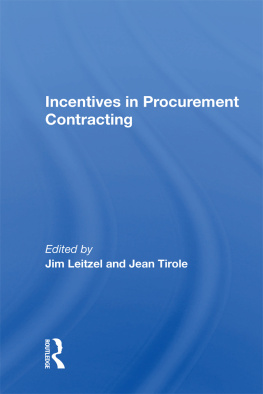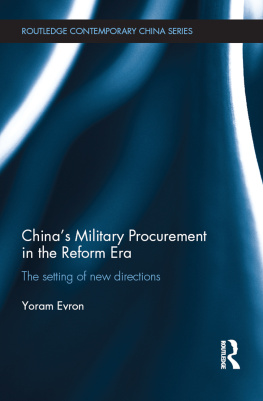Incentives in Procurement Contracting
Pew Studies in Economics and Security
Series Editors
Craufurd D, Goodwin and Jim Leitzel, Duke University
Power, Economics, and Security; The United States and Japan in Focus, edited by Henry Bienen
The Macroeconomic Dimensions of Arms Reduction, edited by F. Gerard Adams
Copping with Complexity in the international System, edited by Jack Snyder and Robert Jervis
Incentives in Procurement Contracting, edited by Jim Leitzel and Jean Tirole
Economics and National Security, edited by Jim Leitzel
Funded by The Pew Charitable Trusts Through the Program for Integrating Economics and National Security
Incentives in Procurement Contracting
Edited By
Jim Leitzel
and Jean Tirole
First published 1993 by Westview Press, Inc.
Published 2018 by Routledge
52 Vanderbilt Avenue, New York, NY 10017
2 Park Square, Milton Park, Abingdon, Oxon OX14 4RN
Routledge is an imprint of the Taylor & Francis Group, an informa business
Copyright 1993 Taylor & Francis
All rights reserved. No part of this book may be reprinted or reproduced or utilised in any form or by any electronic, mechanical, or other means, now known or hereafter invented, including photocopying and recording, or in any information storage or retrieval system, without permission in writing from the publishers.
Notice:
Product or corporate names may be trademarks or registered trademarks, and are used only for identification and explanation without intent to infringe.
Library of Congress Cataloging-in-Publication Data
Incentives in procurement contracting / edited by Jim Leitzel and Jean Tirole.
p. cm. (Pew studies in economics and security)
Includes bibliographical references and index.
ISBN 0-8133-8566-0
1. United StatesArmed Forcesprocurement. 2. Defense
contractsUnited States. I. Leitzel, Jim. II. Tirole, Jean.
III. Series
UC263.I52 1993
355.62120973dc20 92-25357
CIP
ISBN 13: 978-0-367-00801-7(hbk)
Contents
, Jim Leitzel and Jean Tirole
, David P. Baron
, Kathryn Spier
, William P. Rogerson
, Benjamin E. Hermalin
, Robert C. Marshall, Michael J. Meurer, and jean-Franqois Richard
, Dennis Yao
, Tracy Leans and David E. M. Sappington
, Julio J. Rotemberg
, Jean-Jacques Laffont and Jean Tirole
, Tracy Lewis
, Jim Leitzel
, Michael H. Riordan
, Benjamin E. Hermalin and Michael L. Katz
, Jean Tirole
, Lars A. Stole
, Joel Demski
, Michael H. Riordan
, David Besanko
, Richard A. Stubbing
Guide
Many people have had a hand in bringing this volume to fruition. Thanks must first go to the authors, discussants, and participants at the "Incentives in Procurement Contracting" conference. Kirstin Foss Davis and her staff at the conference department of the National Bureau of Economic Research did an excellent job with the conference logistics. Leonardo Felli and Dmitri Vayanos, MIT graduate students in economics at the time of the conference, prepared the written version of the conference discussion. Evelyn Mattis, the administrative assistant at Duke University for the Pew Charitable Trusts' Program for the integration of Economics and National Security, handled correspondence and typing both pre- and post-conference. Finally, thanks to the Pew Charitable Trusts for inspiring and financially supporting this research at the intersection of economics and national security.
Jim Leitzel
Jean Tirole
1
Introduction
Jim Leitzel and Jean Tirole
This volume has emerged from two diverse developments of the past decade. The first development was the rise on the public agenda of U.S. defense procurement practices, unfortunately driven by a host of procurement scandals involving the now familiar trio of waste, fraud, and abuse. The second and more wholesome development was the coming of age of economic models of agency relationships, resulting in a better understanding of incentive contracting. The confluence of these two streams of activity, the application of agency models to defense procurement, has the potential to improve both procurement practice and the economic theory of contracts. The realization of some of these potential improvements is the goal of this volume.
The papers that compose this volume are largely non-technical accounts drawn from the authors' technical research. The economic theory of agency, which is notationally and sometimes technically demanding, is the common framework from which the authors draw their ideas. An unintended side effect of this volume is that it can serve as a non-technical, and far from exhaustive, introduction to agency theory. Readers unfamiliar with the agency literature may get a sense of both the power and the limitations of the economic approach to principal-agent relationships.
While the authors draw on U.S. defense procurement for inspiration, the models that they present apply much more generally. Public regulation of industries, government contracting in non-military sectors, and planning mechanisms in centrally planned economies are just three areas where the agency models presented in this volume have relevance. From within this general framework, many of the authors are able to draw policy recommendations for U.S. defense procurement. Possibilities for improved policies exist in other areas of application as well.
David Baron's paper, "Defense Procurement: Politics, Management, and Incentives," serves as a call to arms for economists interested in defense procurement. He notes that the current incentives in defense procurement are extremely distorted. Applications of optimal contract theory to defense procurement are therefore potentially quite useful, but the realities of the defense contracting world must inform the modeling. Baron discusses these realities and how the models must be altered to incorporate them. The incentive problems are particularly acute with respect to the procurement of major weapons systems. The defense realities in this realm include: (1) an evolving product that cannot be well specified in advance; (2) technological uncertainty; (3) incomplete contracts; (4) unanticipated events; (5) negotiated and renegotiated contracts; and (6) politics. These realities imply, for example, that the Department of Defense (DoD) is unable to commit to long-term contracts, and the contractor may have the bargaining power after production begins. Among the lessons for economic researchers are that optimal contract theory must focus on restricted types of contracts, earlier stages of the procurement process, and ex post efficiency evaluations.
William Rogerson's paper, "Inefficiently Low Production Rates in Defense Procurement: An Economic Analysis," provides one example of the type of analysis that Baron calls for. Production rates for most major weapons systems are too low relative to capacity. Rogerson presents a procurement game between Congress and the military that offers an explanation for this oft-cited fact. In his model, the military wants to maximize the number of units (of a weapon) that are produced. They move first, by choosing capacity, and then Congress chooses the production rate. In equilibrium, the military expands capacity until Congress is just willing to produce (instead of cancelling the weapon program), more output is produced than Congress would like, and the installed capacity is inefficiently large relative to the actual output. The model also offers an explanation of why DoD planning incorporates unrealistic projections of future congressional funding. Empirically, production rate estimates are not overstated once capacity is in place. The overestimates may therefore be part of the military's strategy in the capacity expansion game. Such considerations may also explain DoD reluctance to move to more flexible production technologies.














